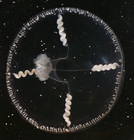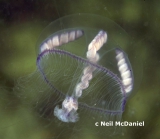
| Introduction | | Search taxa | | Taxon tree | | Taxon match | | Checklist | | Literature | | Stats | | Photogallery | | OBIS Vocab | | Log in |
WoRMS taxon detailsEutonina Hartlaub, 1897
117083 (urn:lsid:marinespecies.org:taxname:117083)
accepted
Genus
Eutonina socialis Hartlaub, 1897 accepted as Eutonina indicans (Romanes, 1876) (type by monotypy)
Tiarops Romanes, 1876 · unaccepted (not in use)
marine,
recent only
Hartlaub, C. (1897). Die Hydromedusen Helgolands. <em>Wissenschaftliche Meeresuntersuchungen.</em> 2: 449-536, pls 14-23., available online at https://www.biodiversitylibrary.org/page/14748081 [details]
Schuchert, P. (2024). World Hydrozoa Database. Eutonina Hartlaub, 1897. Accessed through: World Register of Marine Species at: https://www.marinespecies.org/aphia.php?p=taxdetails&id=117083 on 2024-09-24
Date action by
original description
Hartlaub, C. (1897). Die Hydromedusen Helgolands. <em>Wissenschaftliche Meeresuntersuchungen.</em> 2: 449-536, pls 14-23., available online at https://www.biodiversitylibrary.org/page/14748081 [details]
original description (of Tiarops Romanes, 1876) Romanes, G. J. (1876). An account of some New Species, Varieties, and Monstrous Forms of Medusae. <em>Journal of the Linnean Society of London, Zoology.</em> 12(64): 524-531., available online at https://www.biodiversitylibrary.org/page/31982141 page(s): 525 [details] context source (Hexacorallia) Fautin, Daphne G. (2013). Hexacorallians of the World. (look up in IMIS) [details] basis of record van der Land, J.; Vervoort, W.; Cairns, S.D.; Schuchert, P. (2001). Hydrozoa, <B><I>in</I></B>: Costello, M.J. <i>et al.</i> (Ed.) (2001). <i>European register of marine species: a check-list of the marine species in Europe and a bibliography of guides to their identification. Collection Patrimoines Naturels,</i> 50: pp. 112-120 (look up in IMIS) [details] additional source Cornelius, P. F. S. (1995). North-West European Thecate Hydroids and their Medusae. Part 1. Laodiceidae to Haleciidae. <em>In: R.S.K. Barnes & J.H. Crothers, eds, Synopses of the British Fauna (New Series). The Linn. Soc. London and Est. Coas. Sci. Ass. - Field Studies Council.</em> 50 : i-vii, 1-347. (look up in IMIS) [details]  Present Present  Inaccurate Inaccurate  Introduced: alien Introduced: alien  Containing type locality Containing type locality
From editor or global species database
Diagnosis Eirenidae medusa with 8 statocysts; without cirri; without marginal warts; gonads restricted to subumbrella, not extending onto peduncle. Hydroid stage of campanulinid type, hydrotheca very delicate, in young specimens cylindrical, with diaphragm and conical operculum formed by convergent sharp flaps not demarcated from hydrothecal rim; in old specimens the hydrotheca disintegrates, leaving just a crumpled membranous collar sheath; hydranth with up to 20 amphicoronate tentacles linked by a basal web; gonotheca cylindrical, tapered below, squarely-truncate above, arising from stem just under a hydranth. [details]
|



